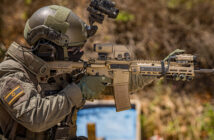There has been much discussion on the issue of licencing security professionals in Australia. This article seeks to outline the issue.
Australian States and Territories, under the relevant Security Industry Licencing Acts require the licencing of those who provide “security advice” (or similar wording). The structure of the licencing system is designed to assess, licence and record those who provide “industry” level security services and their employers. The licencing systems are not suitable for the assessment of those who provide professional-level consulting and engineering services.
Security is a continuum with an “industry” end, a management/artificer level and a “professional” end. Each element is essential in providing the safe and secure environment to which we are all entitled but they are different with different training, recognition, registration and compliance needs. While all practitioners can act “professionally” there are criteria that define a profession from an industry. Much of the discussion and research on this topic can be found on the web site of the Australasian Council of Security Professionals (www.securityprofessionals.org.au).
The intent of the licencing regimes (as stated or inferred in the relevant Acts) appears to be to identify, verify the training and qualification of, and record those who provide security services, predominantly as they relate to interaction with the public specifically:
• Those who provide guarding, installing, monitoring.
• Those who provide training against AQTF (Australian Quality Training Framework) competencies.
• Those who normally work in one jurisdiction.
• Those whose training requirements are clearly defined by AQTF competencies and qualifications,
• Those whose duties are clearly defined in job-descriptions and employment contracts.
• Those whose remuneration is covered under award rates.
Those who provide professional-level advice to management do not fit the criteria. Unlike the security industry, security professionals do not tend to interact on a daily basis with the general public nor are they subjected to media accusations of abuse, harm or intimidation. Any claims of dereliction or incompetence are dealt with through claims of failing to provide professional services.
In most disciplines there is a difference between industry level advisors and professional consultants (builders/architects; book keepers/accountants). In those disciplines where recognition is required, industry licences are usually issued at State/Territory level while professional recognition is usually provided by professional associations, institutes or colleges.
Of note is that in Tasmania, consultants are exempt from licencing as per: “Security advisers, individuals paid or otherwise rewarded to provide security advice about security equipment, methods or principles”. In the Northern Territory, security advisors are not mentioned. In South Australia, advisors appear to be limited to those “providing advice, hiring out or otherwise supplying, or installing or maintaining security alarm or surveillance system”. In Western Australia, Security Consultants are divided into 4 classes, none of which reflect the provision of managerial or engineering advice at senior levels.
Therefore it appears to be only four states (NSW, VIC, ACT and QLD) whose broad definition of “Security Advisor” has by intent or accident encompassed anyone who offers advice. But even here they exempt those who are in-house employees, work with IT security, or deliver non-AQTF security related training. Therefore, in reality, licencing captures a small percentage of the security consultancy population.
Security advisors may be divided into:
a. Those who provide advice on technical issues related to the provision of industry services (guards, technology, monitoring, AQTF related training, etc).
b. Those who provide advice to management on policies, procedures, systems, integration of “life safety disciplines”, engineering considerations, development and delivery of non-AQTF education and training, etc.
For the second group, qualifications are usually at the Diploma, Undergraduate Degree or higher, and are often supported by internationally recognised certifications. These consultants are often members of security specific professional associations and their remuneration is at professional rates usually 10 to 20 times that of award rates.
There is a demonstrated lack of understanding and appreciation by the licencing authorities of the capabilities, services and products of the professional end of the security continuum. This is reflected in a minimum qualification of Certificate IV or in some jurisdictions no minimum qualification (VIC and QLD). Licencing authorities are not equipped to assess qualifications and capabilities of professional providers as, unlike the industry end, the qualifications and competencies are not aligned to the AQTF. No other profession would claim that a Certificate IV is adequate for professional recognition. There is anecdotal evidence of those even with a Master’s degree in Security Risk Management have been required to obtain a Certificate IV qualification to become licenced, simply because that was the wording of the relevant Act.
Licencing authorities may suggest that licencing of security professionals provides assurance to consumers of an appropriate quality of service (in a similar manner to that provided at the industry end). This is not valid because the minimum qualification required (Certificate IV in some jurisdictions and none in others) does not reflect appropriate qualification or capability. Some providers avoid licencing by using alternate terminology to security advice such as: safety, management advice, risk management, emergency management, loss prevention advice, design engineering, architectural support services, etc. Licencing does not address in-house providers often including those employed by larger firms which offer security advice as part of broader services. Licencing does not address those who provide IT security advice and by extension those who provide advice on physical and procedural aspects related to IT.
The Australasian security profession has already begun self-regulation, firstly through the establishment of the Australasian Council of Security Professionals and then through the establishment of the Security Professionals’ Register – Australasia (www.spr-a.com). The Register like most professional registers requires: evidence of relevant qualifications, a preference for membership of relevant professional associations, “fit and proper” person test, commitment to a code of conduct and ethics and evidence of performance at the professional level. The Register provides a greater level of confidence of the qualifications and capabilities of security professionals than the current licencing regimes.
To address the issue of licencing security professionals, licencing authorities must consider restricting licencing of “security advisors” to those who provide advice on technical aspects, specifically those areas related to the licenced industry sectors of guards, technical installations, monitoring and training (AQFT). This would not require amendments of the relevant State Acts, rather the implementation and would align with existing models in SA, WA, NT and TAS. This would require licencing authorities to recognise that those who provide managerial advice to senior business executives on policies, procedures and systems to protect assets and functions are outside the scope of licencing. Most importantly it is recommended that the security profession continue to establish itself as a recognised, self-managing entity that stands equal with other professions.
About the author:
Don Williams CPP, RSecP MIExpE, IABTI,
Don is a recognised leader in the field of security management and analysis with over 70 articles, chapters and other publications on security, risk and emergency management. Don has over 27 year’s experience in security consulting. He assists clients to define “What are we trying to protect, why and from whom?” and to develop solutions that meld with and support the client’s operating environment. He has particular expertise in bomb incident security. Don is a Registered Security Professional and the Executive Officer of the Security Professionals’ Register – Australasia. donwilliams@dswconsulting.com.au





